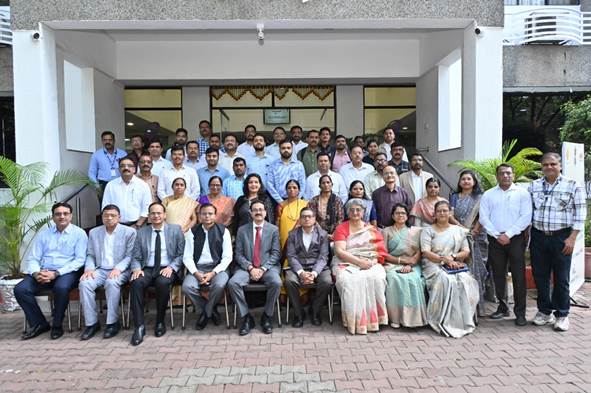Vivek Bharadwaj inaugurates the Two-Day Regional Conference on Strengthening of PESA today at Pune, Maharashtra
Secretary, Ministry of Panchayati Raj Shri Vivek Bharadwaj inaugurated the Two-Day Regional Conference on Strengthening of PESA today at Pune, Maharashtra. Dr. Chandra Shekhar Kumar, Additional Secretary, Smt. Mamta Varma, Joint Secretary, Shri Eknath Dawale, Principal Secretary, Rural Development & Panchayati Raj Department, Government of Maharashtra were also present on the occasion.

In his address, Shri Vivek Bharadwaj commended participating States and stressed upon impact of the PESA Act on tribal communities. Shri Bharadwaj shared firsthand insights into the ground-level challenges faced by tribal communities. Secretary, Ministry of Panchayati Raj also underscored the Government of India’s endeavours in empowering tribal communities.
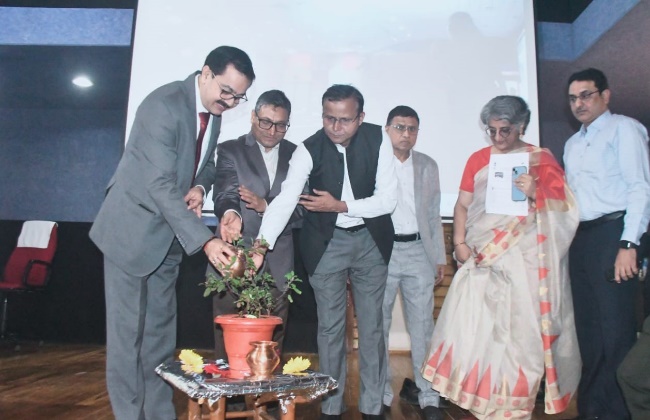
Shri Bharadwaj highlighted the Prime Minister’s vision, emphasizing the implementation of Pradhan Mantri Janjati Adivasi Nyaya Maha Abhiyan (PM-JANMAN) of Ministry of Tribal Affairs, designed to provide comprehensive support to tribal communities. Mentioning the recent launch of the PM JANMAN Mission by the Prime Minister, Shri Bharadwaj reiterated the Government’s commitment and resolves to reach out to tribal groups and Particularly Vulnerable Tribal Groups (PVTGs).
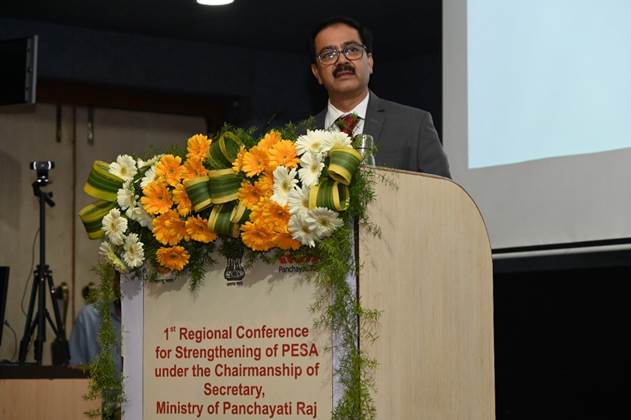
Shri Vivek Bharadwaj called for striving towards continuous improvement in implementation of the Provisions of the Panchayats (Extension to the Scheduled Areas) Act, 1996, popularly known as the PESA Act, which is meant to recognize, empower and promote the social, economic, cultural and political way of life of the Scheduled Tribes.
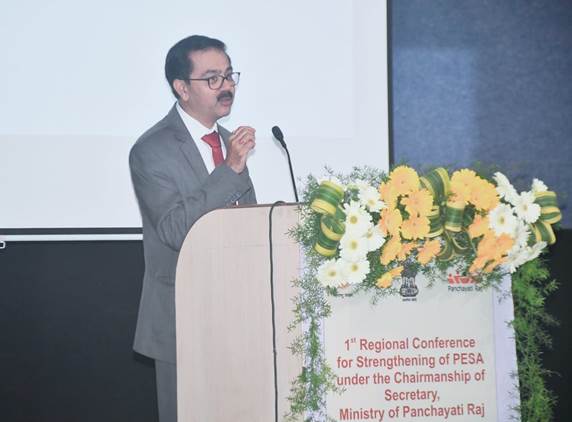
Emphasizing the importance of effective implementation of the PESA Act, Shri Bharadwaj highlighted that it is crucial for making a positive impact on the lives of tribal communities and ensuring their sustainable development. Shri Vivek Bharadwaj suggested that reforms in PESA rules must be centered around welfare of tribal areas and promoting equity, equality, economic empowerment and sustainable livelihoods. PESA Act provides special powers to the Gram Sabhas in Scheduled Areas especially for the management of natural resources in tribal inhabited areas.

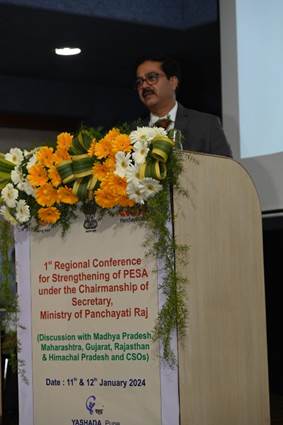
Secretary Shri Vivek Bharadwaj expressed optimism that the Regional Conference of PESA would serve as a platform for fruitful discussions, sharing of best practices, and the exploration of collaborative strategies to address the challenges faced in the implementation of the PESA Act. Shri Vivek Bharadwaj urged all participating States to work collectively towards creating a more inclusive and empowered environment for the tribal population residing in Scheduled Areas.
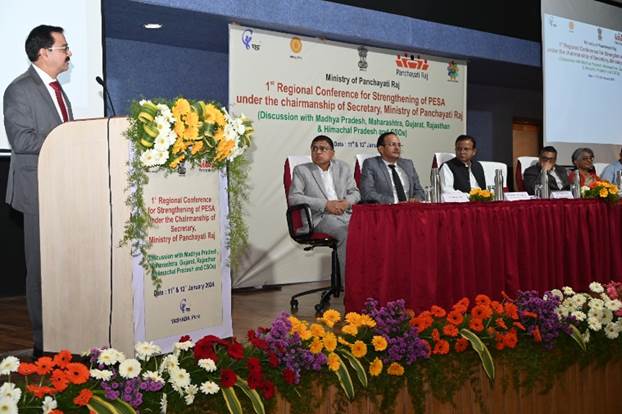
Addressing the PESA Regional Conference Additional Secretary Dr. Chandra Shekhar Kumar emphasized on the need for data driven approach to policy formulation in PESA areas and need for reforms to strengthen GramSabhas. He recommended a dedicated MIS system for real-time information and underscored the importance of aligning Development Plans with PESA in GPDP Guidelines. Need for modifying of Ministry’s application such as GPDP and efforts towards the convergence of tribal sub-plans were also highlighted.
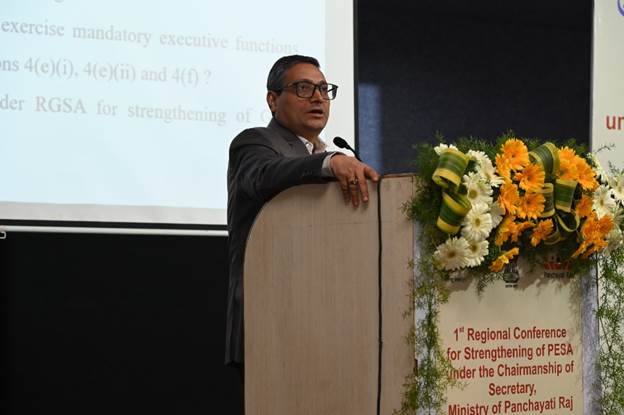
Joint Secretary Smt Mamta Varma made a presentation giving an overview on compliance of PESA Rules and emphasized on utilising tools such as GramManchitra for effective planning. She offered valuable insights into the ongoing formulation of PESA rules by various States. She emphasized the significance of tools such as Gram Manchitra for facilitating efficient planning in PESA-designated areas. Furthermore, attention was drawn to the distribution of a standardized format for data collection, aimed at identifying key indicators for both economic and social development. The imperative to disseminate knowledge at the grassroots level was also underscored.
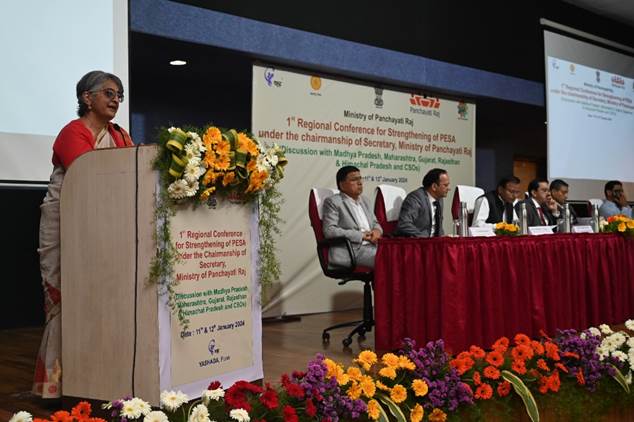
Principal Secretary Shri Eknath Dawale highlighted the transformative impact of implementing the PESA Act, emphasizing the shift from delivering benefits to empowering tribal communities through informed participation. He stressed upon the differentiation between Gram Sabhas of Gram Panchayat and villages in PESA areas. Additionally, Shri Dawale shared that approximately Rs. 250 Crore of untied funds are disbursed in PESA areas, amounting to around Rs. 3 lakhs per Gram Sabha. He also underscored the necessity for effective fund convergence in PESA areas. He expressed the hope that more deliberation should take place in this conference on how the funds received for the development of the tribal majority areas under PESA can be used more efficiently.
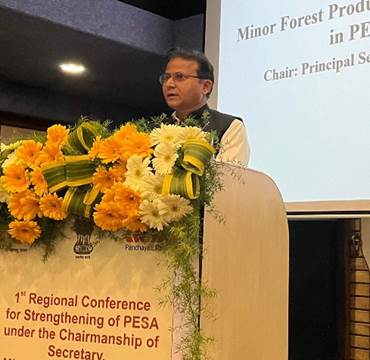
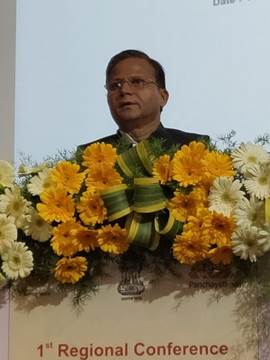
Dr. Mallinath Kalshetti, DDG, YASHADA & Director, State Institute for Rural Development (SIRD), representatives from the Ministry of Tribal Affairs and State Department of Panchayati Raj, State Institutes of Rural Development & Panchayati Raj (SIRD&PRs), and other key stakeholders, representatives of Panchayati Raj Institutions from the five participating States viz. Maharashtra, Madhya Pradesh, Gujarat, Rajasthan and Himachal Pradesh and Civil Society Organizations were also present in the Conference. The Regional Conference is scheduled to take place over two days, on the 11thand 12thof January 2024.
This Regional Conference saw active participation from five States, namely Maharashtra, Madhya Pradesh, Gujarat, Rajasthan and Himachal Pradesh, and other stakeholders showcasing a commitment to advancing regional governance through PESA. The deliberations focused on key themes, including the effectiveness of Gram Sabhas, the management of minor forest produce and minerals, and the role of non-government stakeholders in strengthening PESA implementation. Over the two days, six sessions covered various subjects, fostering meaningful discussions with senior officials, elected representatives, and NGOs from the participating states. This conference, with active participation from these 5 States will spur greater discussions and contribute to the improved implementation of the PESA Act.

The main objective of this Regional Conference is to assess the progress made by the States in implementing the PESA Act and to develop a common vision on its impact at the grassroots level. The conference aims to foster collaboration and discussions among participating States on enhancing the implementation of the PESA Act for the sustainable development of tribal communities in Scheduled Areas. The two-day Region Conference during 11th – 12th January 2024 will feature Technical Sessions, discussions and presentations by Panchayat representatives, field functionaries and experts from participating States and various Government/ Non-Government Organizations, providing a comprehensive platform for knowledge exchange and collaboration. The Regional Conference is expected to culminate in actionable insights and recommendations to enhance the effectiveness of the PESA Act in promoting the welfare and sustainable development of tribal communities.

